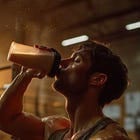Nutrition Strategies For Better Sleep In Athletes
Evidence-based nutrition strategies that actually work.
📢 Quick heads-up: For the rest of the month, you can lock in a lifetime subscription to Strength Science. That’s a one-time payment for unlimited access to the FULL archive. Grab it here and enter this coupon code bfss for a little treat. 💪
Are you training hard but not recovering like you should, or making the progress you expected? Sleep problems plague up to 78% of elite athletes, yet nutrition might be the biggest lever of change that many are overlooking.
Key Points
This scoping review examined 12 studies investigating how specific nutritional strategies affect sleep quality and quantity in elite athletes. The research used rigorous assessment tools to evaluate both the scientific quality of studies and their real-world application for athletes and practitioners.
Aim
The study aimed to systematically map existing evidence on nutrition interventions and exposures that promote sleep in elite athletes, assess their practical applicability, and identify which strategies actually work in real-world training and competition settings.
Methods
Researchers conducted a comprehensive scoping review following PRISMA guidelines, searching five major databases through December 2024. They included randomised controlled trials, crossover studies, and observational studies involving elite athletes (18+ years old) competing at national or international levels. The median participant group size was 19 athletes. Studies were evaluated using NUQUEST to assess methodological rigour and risk of bias, plus the Paper to Podium Matrix to determine how well research translates to practice.
Results
High-Potential Interventions:
Kiwifruit showed impressive results in 15 elite sailors and runners. Consuming 2 kiwifruit 1 hour before bed for 4 weeks significantly improved Pittsburgh Sleep Quality Index scores from 6.47 ± 2.17 to 4.13 ± 1.19. Total sleep time increased from 7.6 ± 0.75 hours to 8.55 ± 0.44 hours by week 4—nearly an hour more sleep. Sleep efficiency improved significantly across weeks 2-5, with fewer awakenings and reduced time awake after sleep onset.
Tart cherry juice demonstrated benefits in 19 elite female hockey players. Five servings over 48 hours (30 mL tart cherry juice in 200 mL water, consumed morning and evening) significantly improved time in bed and reduced periods of wakefulness and movement during sleep, though melatonin and cortisol levels didn’t change significantly.
Dairy consumption showed gender-specific effects in 679 Japanese elite athletes preparing for the 2016 Olympics. Women consuming milk 5-7 days per week had significantly better subjective sleep quality compared to those drinking less frequently. This association remained after adjusting for smoking, drinking, and sleep duration. Interestingly, no similar benefit was observed in male athletes.
Moderate-Potential Interventions:
Probiotics taken daily for 17 weeks by 19 elite male rugby players showed indirect sleep benefits. Muscle soreness decreased by approximately 0.5 units and leg heaviness by 0.7 units in the probiotic group. As muscle soreness and C-reactive protein levels decreased, sleep quality, quantity, and motivation improved across both groups.
Protein and tryptophan showed mixed results. Good sleepers consumed approximately 1.6 g/kg body weight protein daily with 1350 mg tryptophan. However, athletes already consuming high protein diets (>2.5 g/kg body weight) showed no additional sleep improvements from extra protein or tryptophan supplementation. Evening protein intake (>1 hour pre-sleep) was associated with shorter sleep onset latency in some studies.
Alpha-lactalbumin (40 g consumed 2 hours before bed) showed no improvements in total sleep time or sleep efficiency in 6 male elite cyclists. However, in 18 semi-professional female rugby players, it significantly shortened sleep onset latency during the competitive season, suggesting potential gender-specific benefits.
Micronutrients played supporting roles. In 32 elite female Australian Football League players, for each 1 mg increase in daily iron intake, sleep duration increased by 0.55 minutes, and sleep efficiency increased by 0.05%. Each 1-μg increase in vitamin B12 decreased time awake after sleep onset by 1.7 minutes and improved sleep efficiency by 0.4%. Each 1-mg increase in zinc improved sleep efficiency by 0.23%
Meal timing mattered. Every additional hour between the main evening meal and bedtime was associated with an 8-minute decrease in total sleep time and a 2-minute decrease in wakefulness after sleep onset in 36 male elite AFL players.
Energy availability was crucial. In 115 elite athletes across multiple sports, insufficient calorie intake was associated with poorer sleep. Good sleepers consumed more total energy, protein, and tryptophan than poor sleepers.
Uncertain or No-Effect Interventions:
Carbohydrate intake pre-bed showed conflicting evidence. In 32 elite female players, for each 1 g/kg increase in daily carbohydrate, time awake after sleep onset increased by 3.6 minutes and sleep efficiency decreased by 0.6%. High sugar intake before bed was similarly problematic in male AFL players. The relationship between carbohydrates and sleep appears complex and individual.
Whey protein supplementation (55 g containing 1 g tryptophan) consumed in the evening showed no improvements in sleep duration or quality in 15 elite male AFL players who were already sleeping adequately (7.9 ± 1.1 hours on training days). The researchers suggested a ceiling effect may exist when athletes already meet sleep needs.
Casein timing (40 g consumed either at 10:30 PM, 6:30 PM, or 40 g carbohydrate at 10:30 PM) showed no significant differences in sleep quality among 24 professional U23 cyclists during a 6-day training camp, despite protein intake exceeding 2.5 g/kg body weight.
Practical Takeaways
For Immediate Implementation:
Try 2 kiwifruit 1 hour before bed consistently for at least 4 weeks. This food-based intervention showed the most robust improvements across multiple sleep metrics with minimal risk.















